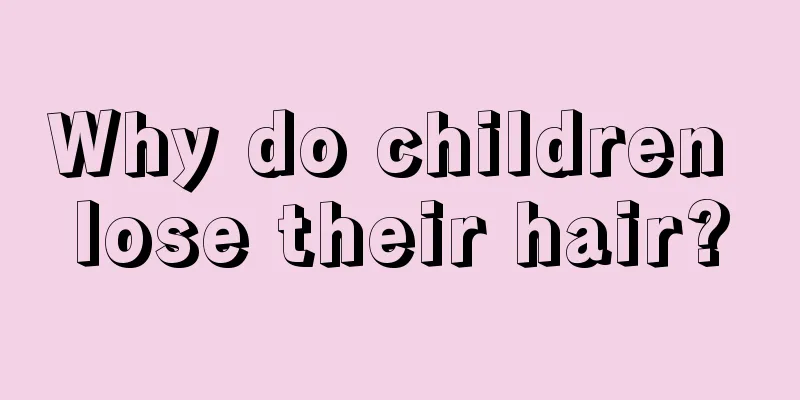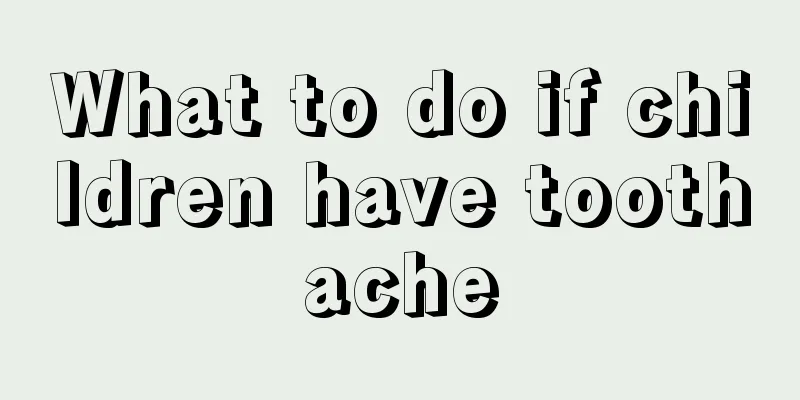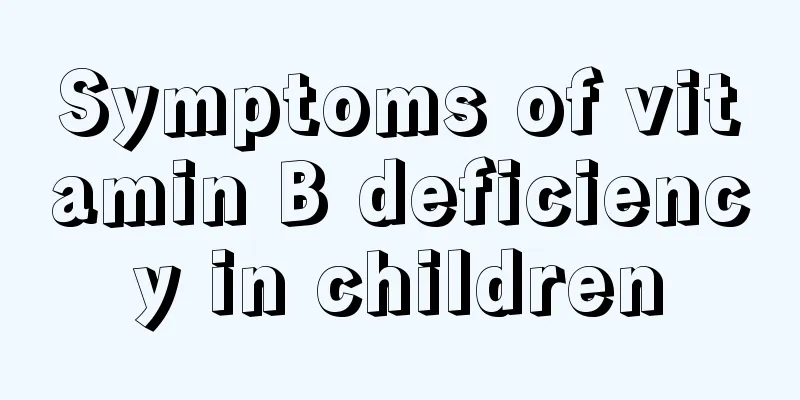Why do children lose their hair?

|
We adults lose hair every day, but children hardly lose any hair. If a child loses hair, you need to consider why the child is losing hair. Hair loss in children is also related to disease. For example, if childhood cancer occurs, more serious hair loss will occur. Inflammation of the scalp, such as scalp ringworm, can also cause hair loss, so hair loss needs to be examined and treated. Common causes of hair loss in children Childhood cancer: Many people believe that childhood cancer is one of the main causes of hair loss in children. In fact, cancer does cause hair loss, and it can be severe, but this is usually caused by the cancer treatment process (such as chemotherapy or radiotherapy), not the cancer itself. Telogen effluvium: Telogen effluvium is another major cause of hair loss in children, but it often goes unnoticed by many parents. Telogen effluvium in children is usually caused by illness, such as fever, surgery, excessive weight loss, etc. Even excessive stress can cause telogen effluvium. Generally, there will be sudden and massive hair loss after 6 weeks to 3 months. The hair loss time usually ranges from a few weeks to several months. During this period, the child's hair will become sparse and new hair will begin to grow. Therefore, no treatment is needed and the child's hair will recover after a few months. Scalp ringworm (tinea capitis): Scalp ringworm is also one of the more common causes of hair loss. This condition is easy to identify: there are usually red circular lesions, hair loss, and a lot of scaling, and the scalp will itch. Bacterial infection: Bacterial infection may also cause hair loss. The symptoms are similar to scalp ringworm, but it is not scalp ringworm. It is usually caused by Staphylococcus aureus. Traction alopecia: If your child often wears tight braids or ponytails, it may also cause hair loss. In infancy, the baby's head is often rubbed against the crib, which can also cause hair loss. Pulling hair: Some babies will pull or scratch their hair unconsciously (just like sucking their fingers). This habit usually disappears naturally after 2-3 years old. But some children will continue to maintain this habit. If the situation is serious, you can cut the child's hair short or divert the child's attention to avoid serious hair loss. Trichotillomania: Trichotillomania is a psychological disorder characterized by compulsive pulling that results in hair loss, often preceded by feelings of tension and followed by a sense of relief or satisfaction. This situation requires consultation with a child psychiatrist or psychological clinic. Alopecia areata: Alopecia areata is an autoimmune disease. The child's immune system attacks the hair follicles, slowing hair growth and causing non-scarring hair loss in round or oval patches. Treatments include steroid injections and topical medications (such as minoxidil, anthralin cream, or high-dose steroid ointments). Alopecia totalis and alopecia universalis: Similar to alopecia areata, but the symptoms are more severe. The child will lose all hair (alopecia totalis) or all hair and body hair (alopecia universalis). The chance of cure is smaller than alopecia areata, so it must be treated in time. Certain diseases: In addition to the common causes mentioned above, some diseases may also cause hair loss, such as thyroid disease (including hypothyroidism and hyperthyroidism); chronic diseases (such as systemic lupus erythematosus, diabetes, iron deficiency anemia, etc.); malnutrition; vitamin A poisoning. If hair loss is caused by these diseases, it is usually accompanied by other symptoms. For example, vitamin A poisoning can also cause headaches, vision changes, irritability, vomiting, weight gain and other symptoms. Abnormalities in the structure of the hair shaft: Hair loss can also be caused by abnormalities in the structure of the hair shaft, which usually leads to hair that is prone to breakage and dryness. What should I do if my child loses hair? If you find that your child is losing hair abnormally, be sure to see a doctor. The doctor will help you find the cause of your child's hair loss so that you can provide appropriate treatment. If it is telogen effluvium, there is no need to intervene, the hair will grow out naturally after a few months. If it is caused by bacteria or fungi, corresponding topical medications can be used. If it is traction alopecia, you just need to take good care of your hair and scalp before the hair grows out. It should be noted that baby's hair is fragile, so it is best to leave the baby with a natural hairstyle, do not tie the hair into tight braids, and be gentle when combing the hair. If it's alopecia areata, your doctor may prescribe medication to stimulate your child's hair growth or refer your baby to a dermatologist for further examination. If your child has a habit of pulling his hair, don't scold him loudly. Instead, understand the reasons for his anxiety or tension and seek medical help if necessary. If hair loss is caused by a certain disease, the disease should be treated. As long as the disease is cured, the hair will grow again if you wait patiently for a few months. |
<<: Is it normal for a 4 year old to lose hair?
>>: Baby, why is your hair falling out?
Recommend
Four things that babies need when using air conditioning in summer
In the hot summer, parents are very worried about...
What causes swollen eye bags in children?
Generally speaking, some older people are prone t...
Nutritional value of carrots for babies
I believe everyone knows that eating carrots has ...
Baby's saliva is foamy
The presence of foam in the baby's saliva is ...
The dangers of flu vaccination for children
We think it is normal for children to get flu vac...
How long is the isolation period for hand, foot and mouth disease?
Hand, foot and mouth disease has been a high inci...
How to treat a 2-year-old baby grinding his teeth while sleeping
Many people grind their teeth when they sleep. Th...
What to do if your child has swollen tonsils and snores
Snoring, also known as sleep apnea syndrome, affe...
Newborn baby with swollen belly
After a baby is born, since the baby's physic...
What are the causes of high blood sugar in newborns?
Newborns are the hope and future of their parents...
How to practice aerobic dance for children
Nowadays, teachers will teach children to dance i...
What is the cause of heel pain in a 10-year-old child?
Children are in a lively and active period, so it...
If the baby has a fever and cramps, will there be any sequelae?
Now every child is the apple of our eye. Many peo...
How long does a six month old baby need to sleep?
How much sleep does a six-month-old baby need? Ba...
Baby's skull closure time
Any problems that occur with babies are a major c...









